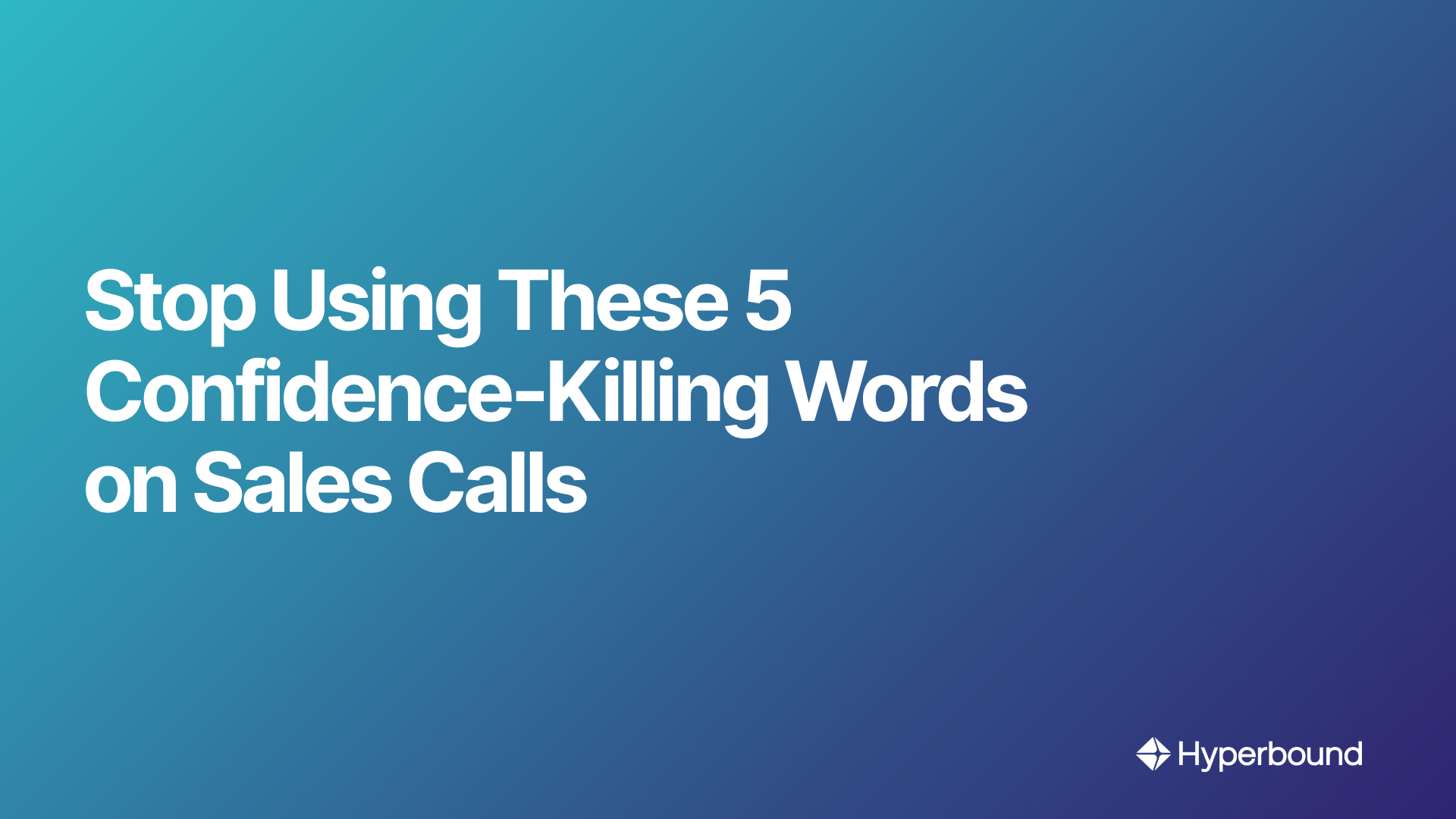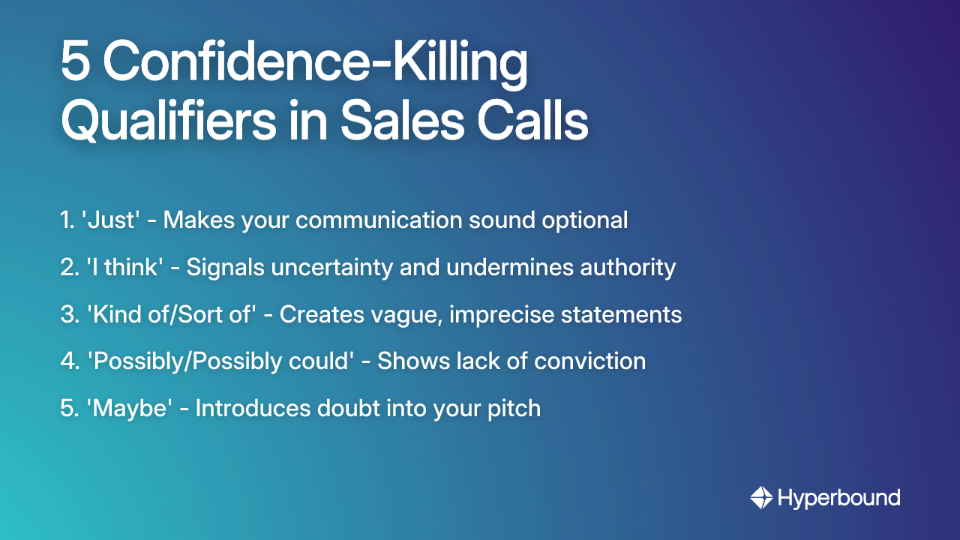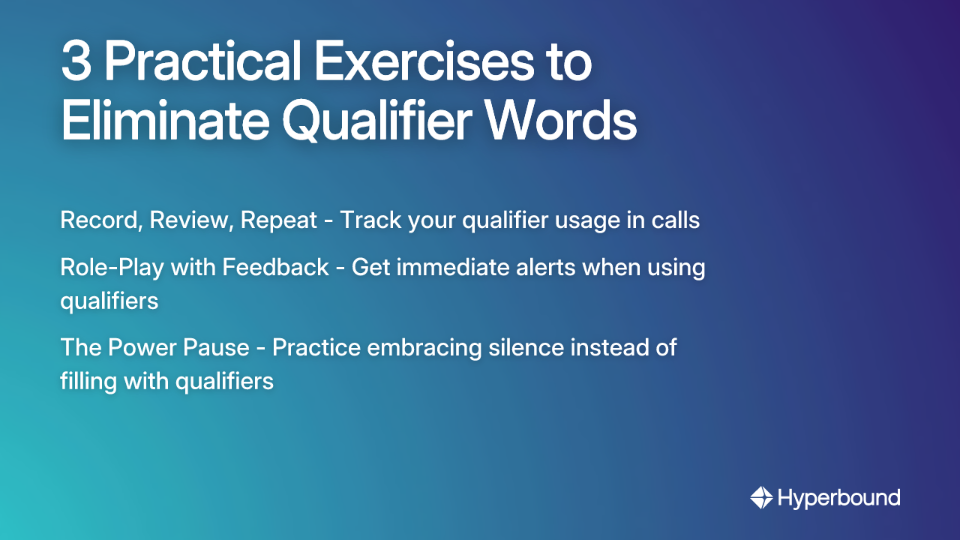
You've prepared for hours, researched the prospect, practiced your pitch, and yet when the moment arrives, you hear yourself saying: "I just wanted to check if maybe you might be interested in our solution that kind of addresses your needs..."
Sound familiar? You've just undermined your entire SaaS sales pitch with a string of qualifier words that make you sound uncertain, apologetic, and lacking confidence.
Why Your Words Are Sabotaging Your Sales Calls
In the competitive world of sales, perception is reality. The words you choose directly impact your credibility and authority. When anxiety creeps in during important calls, many reps default to qualifiers – words that soften statements and unintentionally signal doubt.
As one experienced sales professional noted, "Drop the qualifiers. Words like 'just,' 'kind of,' 'I think,' and 'possibly' are confidence killers." These seemingly harmless words are subtly telling your prospect that you don't fully believe in what you're saying.
The Psychology Behind Qualifier Words
Technical people, especially those transitioning to sales roles, often struggle with this the most. There are several reasons we fall into this trap:
- Fear of Rejection: Using qualifiers feels safer – if the prospect rejects you, at least you didn't come on too strong.
- The Politeness Trap: Many of us were taught that being direct is rude, so we soften our language to appear more courteous.
- Thinking Time: Qualifiers often serve as filler words when we need a moment to collect our thoughts.
- Imposter Syndrome: That nagging feeling that "I don't matter that much" can manifest in hesitant language.
The 5 Confidence-Killing Words to Eliminate Now

1. "Just"
This word instantly diminishes everything that follows it. It's an apologetic qualifier that makes your communication sound optional or unimportant.
How it sounds to prospects: "This person is apologizing for taking up my time before they've even started."
Instead of: "I'm just calling to discuss our solution."Say: "I'm calling to discuss how we can increase your conversion rates by 37%."
2. "I think"
This phrase signals uncertainty and hesitation, undermining your authority as an expert in your field.
How it sounds to prospects: "Even this salesperson isn't convinced about what they're telling me."
Instead of: "I think this feature would benefit your team."Say: "Based on what you've shared, this feature will solve your current workflow bottleneck."
3. "Kind of" / "Sort of"
These qualifiers create vague, imprecise statements that lack conviction and clarity.
How it sounds to prospects: "This person isn't being straight with me or doesn't fully understand their own product."
Instead of: "Our platform kind of integrates with your existing tools."Say: "Our platform seamlessly integrates with your existing tools, eliminating the need for manual data transfer."
4. "Possibly" / "Possibly could"
This signals a lack of certainty and conviction about what you're proposing.
How it sounds to prospects: "If they're not sure their solution will work, why should I risk trying it?"
Instead of: "We could possibly improve your customer retention."Say: "We will improve your customer retention through our proven feedback loop system."
5. "Maybe"
Similar to "possibly," this word introduces doubt and hesitation into your pitch.
How it sounds to prospects: "This person isn't confident in what they're telling me."
Instead of: "Maybe we should schedule a demo next week."Say: "Let's schedule a demo next week to show you exactly how this works."
Are All Filler Words Deal-Breakers?
Interestingly, Hyperbound's analysis of thousands of sales calls reveals that traditional filler words like "um," "ah," and "like" don't significantly impact sales outcomes. Our AI has found no meaningful difference in their usage between top performers and average reps.
Yet the five qualifiers we've discussed are different – they don't just fill silence; they actively diminish your authority. The distinction is crucial: a pause signals thoughtfulness, while a qualifier signals doubt.
Building Your Confidence Muscle: 3 Exercises

Exercise 1: Automate Your Call Reviews with AI
Manually tracking qualifier words is tedious and subjective. Use Hyperbound’s AI Real Call Scoring to do it automatically. It analyzes your real customer conversations, identifies confidence-killing language, and gives you objective data on your speech patterns, helping you track improvement over time without the manual effort.
Exercise 2: Practice with AI Role-Play
While practicing with colleagues is helpful, it’s difficult to scale and feedback can be inconsistent. Hyperbound’s AI Sales Roleplays provide a better way to practice. You can role-play any scenario—from cold calls to objection handling—against a realistic AI buyer that responds to your every word. The AI provides instant, objective feedback on your language, allowing you to build confident speech habits much faster.
Exercise 3: The Power Pause
Often, we use qualifiers to fill uncomfortable silence. Instead, practice embracing the pause. When you feel an "I think" coming on, stop, take a breath, and deliver a clear statement with downward inflection.
A three-second pause feels like an eternity to you but sounds thoughtful and controlled to your prospect. Practice this technique when answering questions during your next team meeting.

Your New Authoritative Sales Script Boilerplate
Replace these common weak phrases with their stronger alternatives:
Opening a call:
- Weak: "I just wanted to see if maybe you had a minute to talk?"
- Strong: "I'm reaching out because our solution has helped companies like yours increase sales pipeline by 40%."
Presenting a solution:
- Weak: "I think we might be able to help you with that. Our solution is kind of designed for it."
- Strong: "We can solve this problem. Our solution was specifically designed to address these exact challenges in the SaaS industry."
Handling objections:
- Weak: "Well, I think our solution is pretty good at handling that, so I think it would possibly work."
- Strong: "I understand your concern. Our solution addresses that effectively by [specific example]."
Closing:
- Weak: "Maybe we could proceed with the next steps? I think this package would serve you well."
- Strong: "Based on our discussion, I recommend proceeding with these next steps. This package will deliver the results you're looking for."
Speak with Authority, Sell with Confidence
Eliminating these five confidence-killing words is a small linguistic change with massive psychological impact. This isn't about being aggressive; it's about communicating with clarity and conviction.
Remember, if you struggle with confidence, focus on conveying excitement. As one successful rep advised, "If you can't sound confident, why don't you try excited?" Whether you're a customer care rep or an enterprise sales executive, your enthusiasm paired with authoritative language makes a compelling combination.
Your challenge: Choose one qualifier word from this list and make it your mission to eliminate it this week. Start recording your calls today. Your future deals will thank you.
Frequently Asked Questions
What are qualifier words in sales?
Qualifier words are words and phrases that soften a statement, unintentionally signaling doubt, uncertainty, or a lack of confidence to the prospect. They include words like "just," "I think," "kind of," "possibly," and "maybe," which can undermine your credibility and the perceived value of your solution.
Why is it important to eliminate words like 'just' and 'maybe' from a sales pitch?
It is important to eliminate these words because they act as "confidence killers" that weaken your authority and make you sound apologetic or unsure about your product. When a prospect hears qualifiers, they may question your expertise and the effectiveness of your solution, making them less likely to buy.
How can I effectively stop using qualifier words?
You can stop using qualifier words by practicing three key exercises: recording and reviewing your calls to identify your speech patterns, using AI role-play scenarios to build new habits in a safe environment, and practicing the "Power Pause" to replace filler language with thoughtful silence.
Are filler words like 'um' and 'ah' as bad as qualifier words?
No, traditional filler words like 'um' and 'ah' are not as damaging as qualifier words. Analysis of sales calls shows no significant difference in the use of these fillers between top and average performers. Qualifiers actively diminish your message's authority, while fillers like 'um' are often perceived as momentary pauses for thought.
What are some strong alternatives to common qualifier phrases?
Instead of using weak qualifiers, use direct and confident language. For example, replace "I think this will help" with "This feature will solve your bottleneck." Instead of "Maybe we can schedule a demo," say "Let's schedule a demo to show you how this works." Focus on making definitive statements based on the value you provide.
How can AI tools help me speak more confidently in sales?
AI tools can automatically analyze your sales calls to identify and track your use of specific qualifier words, providing objective data on your speech patterns. Furthermore, AI-powered role-play simulations allow you to practice sales scenarios against a realistic AI buyer and receive instant feedback, helping you build confident language habits much faster than traditional methods.

Book a demo with Hyperbound
.png)













